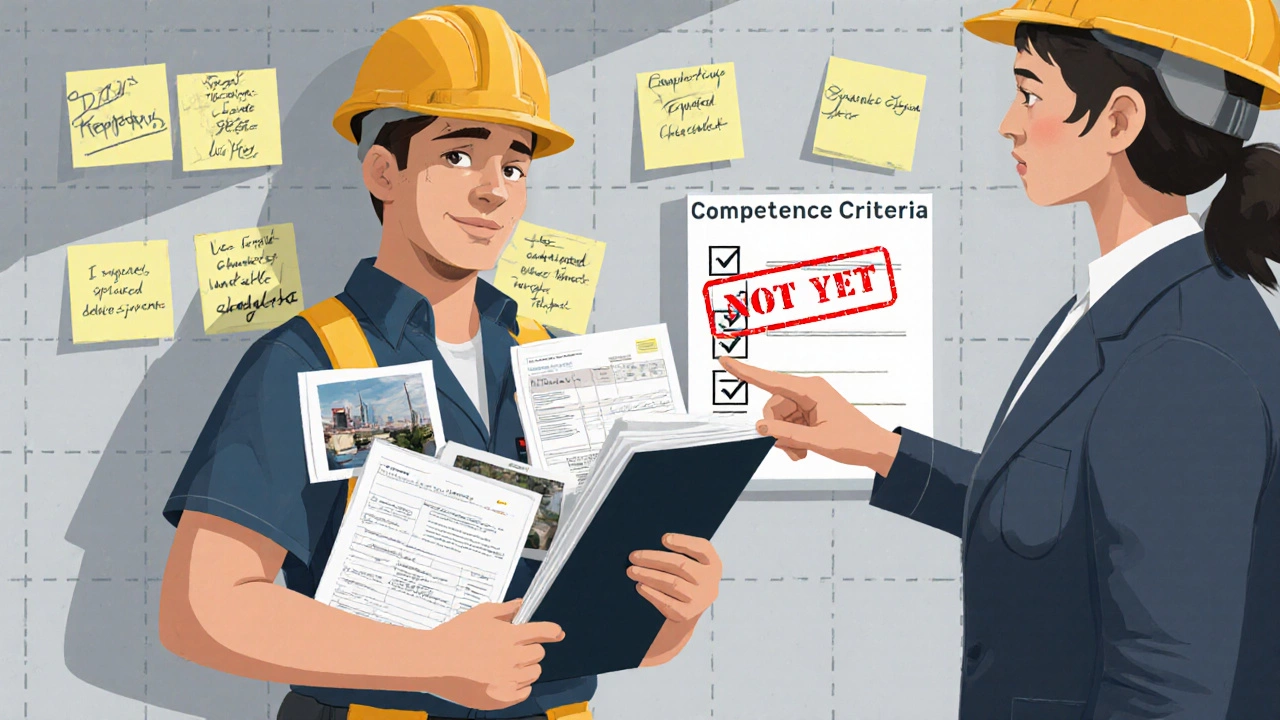NVQ Evidence Checklist
Check your evidence readiness
Complete this checklist to ensure you have the necessary evidence for your NVQ unit.
People often ask if you can fail an NVQ. The short answer? Not in the way you fail a school exam. But that doesn’t mean you can just show up and walk away with a certificate. NVQs are all about proving you can do the job-right, safely, and consistently. If you can’t show that, you won’t get the qualification. And yes, that feels like failing-even if the system doesn’t call it that.
How NVQs Work (It’s Not a Test)
NVQs stand for National Vocational Qualifications. They’re not written exams. They’re not multiple-choice quizzes. Instead, you’re assessed on what you can actually do in your workplace. An assessor watches you, asks you questions, checks your work, and reviews your portfolio of evidence-things like photos of completed tasks, witness statements from coworkers, or signed checklists.
Think of it like getting your driver’s license. You don’t pass by memorizing traffic laws. You pass by driving well, safely, and repeatedly under real conditions. If you keep stalling on hills, running red lights, or forgetting to check mirrors, you won’t pass. Same with NVQs. It’s not about how much you know. It’s about what you can do, every single time.
What Happens If You Don’t Meet the Standard?
There’s no official ‘fail’ grade on an NVQ certificate. But if your assessor says you’re not yet competent in a unit, you get feedback-not a red mark. You’ll be told exactly what you missed. Maybe you didn’t follow safety procedures correctly. Maybe you couldn’t explain why you used a certain tool. Maybe your work wasn’t consistent across three separate observations.
Then you get another shot. You fix the gaps. You practice. You try again. Most people who don’t complete their NVQ on the first try do so because they didn’t gather enough evidence, or they didn’t fully understand what ‘competence’ means. It’s not about being bad at your job. It’s about proving you’re good enough, consistently, under assessment conditions.
Why People Think They’ve Failed
Many learners assume they’ve failed when they’re told they need more evidence or another observation. They hear ‘not yet competent’ and think it’s the same as ‘failed.’ But it’s not. It’s a delay. A detour. A chance to improve.
One electrician I spoke to in Bristol spent six months trying to get his Level 3 NVQ. He kept missing one unit: electrical installation testing. He’d do the wiring fine, but he’d forget to document his test results properly. His assessor kept telling him: ‘Show me the paperwork, not just the wires.’ He thought he was failing. He wasn’t. He just needed to change how he worked-not what he did.
That’s the key difference. NVQs don’t test your skill. They test your ability to prove it. If you’re good at your job but bad at paperwork, you’ll struggle. Not because you’re incompetent. But because the system needs proof.

Common Reasons People Don’t Complete Their NVQ
- No clear evidence: Taking photos, keeping logs, saving emails-most people don’t realize how important this is until it’s too late.
- Missing observations: Your assessor needs to see you do the task three times. If you’re off sick, on holiday, or your workplace is quiet, it gets delayed.
- Confusion over criteria: The assessment handbook is full of jargon. ‘Demonstrate safe working practices’ sounds simple. But what counts as ‘safe’? Your assessor has a checklist. You need to match it.
- Going it alone: People who don’t talk to their assessor, or who wait for feedback instead of asking for it, often stall. NVQs are a partnership.
- Not working in the right environment: You can’t do a Level 2 NVQ in plumbing if you’re only doing minor repairs at home. You need real, regulated work.
What Happens If You Never Finish?
If you stop trying, you don’t get the certificate. That’s it. No formal fail. No mark on your record. But you also don’t get the qualification you trained for. That affects promotions, pay rises, and eligibility for certain jobs.
Some employers require NVQs to comply with industry regulations. If you’re in construction, health care, or electrical work, not having your NVQ can mean you’re not allowed to do certain tasks-even if you’re skilled. It’s not about your ability. It’s about compliance.
There’s no time limit to complete an NVQ. You can take years. Some people finish in 6 months. Others take 3 years. That’s normal. But if you stop engaging, the assessor will eventually close your file. And restarting can mean redoing work you already did.

How to Avoid Getting Stuck
- Ask for the assessment plan: Before you start, get a copy of the unit criteria. Know exactly what you need to prove.
- Keep a daily log: Write down what you did, who you worked with, and what tools you used. Snap photos. Save emails. These become your evidence.
- Check in monthly: Don’t wait for your assessor to contact you. Ask: ‘What do I need next?’
- Practice explaining your work: Your assessor will ask ‘Why did you do it this way?’ Be ready. Don’t just say ‘because that’s how I was taught.’
- Use your workplace: If you’re doing a Level 3 NVQ, make sure you’re working on complex tasks-not just basic ones. Your assessor needs to see you handle real challenges.
What If You’re Still Struggling?
If you’ve tried everything and still can’t meet the standard, talk to your training provider. Some offer extra support-like one-on-one coaching, mock assessments, or help with paperwork. Others might suggest switching to a different qualification, like a City & Guilds or a T Level, if the NVQ isn’t the right fit.
There’s no shame in that. NVQs are designed for people who learn by doing. If your job doesn’t give you the right opportunities, or if you’re more comfortable with theory, another route might suit you better.
Bottom Line: You Can’t ‘Fail’-But You Can Be Left Behind
NVQs aren’t pass/fail. They’re complete/incomplete. If you don’t gather the evidence, don’t show competence, or stop engaging, you won’t get the certificate. That’s not a failure. It’s a missed opportunity.
But if you’re willing to put in the work-keep records, ask questions, and show up for observations-you will get there. Most people who finish their NVQ do so after one or two extra attempts. It’s not about being perfect. It’s about being consistent.
Don’t wait until your assessor says ‘not yet competent’ to panic. Start now. Document everything. Ask for help. And remember: this isn’t a test of your intelligence. It’s a test of your practice. And you can always practice again.
Can you fail an NVQ if you don’t pass a written test?
No, NVQs don’t have written exams. You’re assessed on your ability to perform tasks in your actual job. If you can’t show competence during observations or through your portfolio, you won’t complete the qualification-but that’s not called a ‘fail.’ It’s a request for more evidence or another attempt.
How many times can you retry an NVQ unit?
There’s no official limit. You can keep trying until you meet the standard. Most people complete a unit within two or three attempts. Your assessor will tell you what’s missing and give you time to improve. The only limit is how long you’re willing to keep working at it.
Do NVQs expire if you don’t finish them?
No, NVQ units don’t expire. The evidence you’ve collected stays valid. But if you stop engaging for over a year, your assessor may close your file. Restarting means reconnecting with your provider and possibly re-submitting some evidence, but you won’t need to redo everything from scratch.
Can you get an NVQ without a job?
Generally, no. NVQs require you to be working in the role you’re being assessed for. You can’t do a Level 3 NVQ in plumbing if you’ve never installed a bathroom. Some providers offer simulated assessments, but these are rare and only for specific cases. Most NVQs are tied to real workplace performance.
Is an NVQ harder than a degree?
It’s not harder-it’s different. A degree tests your knowledge through exams and essays. An NVQ tests your ability to do the job. Many people find NVQs harder because they require constant real-world performance, not just studying. But others find them easier because they don’t need to memorize facts. It depends on how you learn.





Write a comment